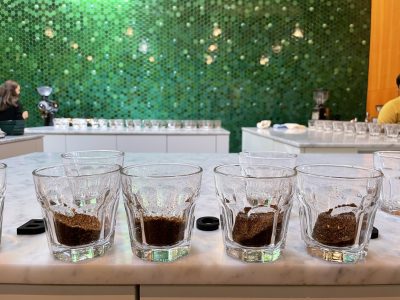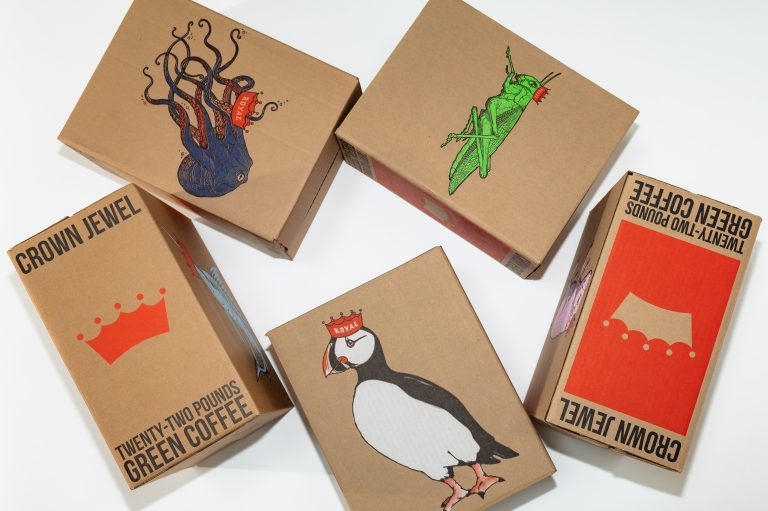At the end of July, Catracha Coffee single farm micro-lots arrived in the Royal warehouse in Oakland, California. The coffees were produced by individual farmers in Santa Elena, Honduras, and the lots ranged from 5 to 20 bags. All bags were printed with the farmer’s name to ensure traceability. While the coffee has been selling fast, there are still bags available from Santiago López and Antonacio Nolasco.
As pallets of coffee ship to roasting warehouses across the world, our team has been analyzing information we collected at origin during the growing, harvesting, and processing of the coffee. The data was gathered as part of the Catracha Quality Project, an initiative focused on supporting the production of specialty coffee among Catracha Coffee farmers in Honduras.

Above: Santiago Lopez, a participant in the Catracha Quality Project.
In the following weeks, we will be publishing some of the more interesting results, including full process maps that outline the methods of Catracha farmers. We analyzed how individual factors during the harvest and processing of coffee can correlate to a high cup score.
We also placed data loggers inside different coffee bags that traveled from Honduras to Oakland on a container ship. We want to understand how the coffee is affected by temperature and humidity changes during the trip, an area of mystery in the industry.
Royal hopes to start a conversation with our customers. We consider this information a good foundation—it’s a baseline data set—and believe that definitive findings will come after we have a few years of results.
I’ll outline our methodology below to provide context to those that have not been following the Catracha Coffee chronicles on our blog. Now might be a good moment to go back and review some of the older posts (like a trip report from our data team and a description of how Catracha producers are fighting leaf rust).
Catracha Coffee is a coffee-buying social enterprise that connects smallholder farmers in Santa Elena, Honduras with the specialty coffee market through a relationship with Royal Coffee. The project was created by Mayra Orellana-Powell and her husband Lowell Powell. Mayra grew up in Santa Elena, and she developed the project with a mission: to support smallholder farmers in the local community (she gave an incredible talk on a producer driven approach to coffee at SCAA Symposium in 2015).
The municipality of Santa Elena has a population of roughly 15,000 people, and coffee is grown at elevations between 1,500 and 1,800 meters above sea level. In 2014, Catracha had relationships with about a dozen farmers. As the organization’s capacity grew, the number of farmer relationships more than doubled in 2015 to 30 producers. Continuing with that trend, 60 farmers are now in the Catracha tent—evidence that people in Santa Elena are buying into this model.
Mayra was inspired to start the project by her grandmother, a coffee producer herself. She designed the project to increase earnings of producers through a profit sharing model. The farm gate returns over the last four years have averaged $2.50 a pound. In addition to this work, Mayra is also Royal’s Director of Marketing & Outreach.
Catracha has been supported by Royal Coffee for five years. In 2012, Max Nicholas-Fulmer, Royal’s CEO, and green buyers from Roast Co and Blue Bottle Coffee visited Santa Elena and hosted a quality cupping for local producers. The trip and Mayra’s story is chronicled in the film “The Way Back to Yarasquin,” produced by Sarah Gerber (watch it!).
The Catracha Quality Project was created to support the production of specialty coffee in Santa Elena through standardized and optimized post-harvest processes. The quality project team collected data during the harvest and is now processing that information. The team includes Arvin Juan, Andy Noblet, John Casazza, myself and everyone leading the charge at The Crown: Royal Coffee Lab & Tasting Room.

Above: Catracha Coffee’s Lowell Powell has been leading the quality project’s data team.
During the peak harvest season — December, January and February — farmers in Santa Elena agreed to collect information at four different micro-wet mills for the Catracha Quality Project. Farmers collected data each day that they harvested and processed coffee cherry.
The participating farmers recorded the weight of the picked cherry and rejected cherry, that is coffee that was not ultimately processed. They also recorded the amount of time that the de-pulped coffee fermented and measured the pH of the mucilage in the tank at the beginning and end of the fermentation period.
Farmers recorded the amount of time that the coffee parchment dried on patios and on raised beds inside solar dryers. While all of this data was being meticulously hand recorded by diligent producers, data loggers were simultaneously capturing the humidity and temperature—both ambient and inside the solar dryers—around the clock.
After the coffee was processed and before it was prepared for export, a sample from each day of the harvest on all four wet-mills was collected and shipped to Royal Coffee’s lab in Emeryville, California.In April, 43 samples from more than half a dozen farmers were evaluated on the Royal cupping table by coffee professionals from Blue Bottle Coffee, Flying Goat, Equator, Andytown, Mr. Espresso, and Tico Roasters.
Since this cupping, our team has been working to turn all the data into useful baseline information for farmers, and for our customers. In the coming weeks, we will be publishing our results on the Royal blog, so please check back here.
When Mayra founded Catracha Coffee Company in 2010, she wanted a coffee business that would have an impact in the community of Santa Elena. The project is in service of that mission, through increased transparency, detailed data analysis and collaboration — between producer, importer, and roaster.

Catracha founder Mayra Orellana-Powell walks through a solar dryer with Patrick Mulvaney, owner of the Sacramento restaurant Mulvaney’s B&L that serves Catracha coffee. The coffee is roasted by Old Soul Co.



Amazing job. You guys rock. Larga vida a los productores de café y la cadena de commercialization más justa